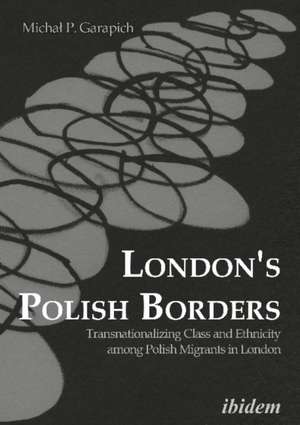London's Polish Borders: Transnationalizing Class & Ethnicity Among Polish Migrants in London
Autor Michal Garapichen Limba Engleză Paperback – iul 2016
Preț: 193.10 lei
Preț vechi: 223.32 lei
-14% Nou
Puncte Express: 290
Preț estimativ în valută:
36.96€ • 40.16$ • 31.07£
36.96€ • 40.16$ • 31.07£
Carte indisponibilă temporar
Doresc să fiu notificat când acest titlu va fi disponibil:
Se trimite...
Preluare comenzi: 021 569.72.76
Specificații
ISBN-13: 9783838206073
ISBN-10: 383820607X
Pagini: 344
Dimensiuni: 150 x 210 x 22 mm
Greutate: 0.46 kg
Ediția:Nouă
Editura: Ibidem Press/Ibidem-Verlag
Colecția Ibidem Press/Ibidem-Verlag
ISBN-10: 383820607X
Pagini: 344
Dimensiuni: 150 x 210 x 22 mm
Greutate: 0.46 kg
Ediția:Nouă
Editura: Ibidem Press/Ibidem-Verlag
Colecția Ibidem Press/Ibidem-Verlag
Recenzii
This is an original and profound piece of ethnography which explores the complex web of meanings attributed to being Polish in London. Based on interviews and participant observation in a multitude of locations, from a shelter for homeless people to Westminster, the book illuminates how migrants construct ethnicity in terms of social class, and vice versa. Garapich argues that there is a clear need to place the discourse of social class at the centre of ethnic and nationalism studies. His book shows brilliantly how migrants use the language of class to share and dispute ideas about what it means to be Polish abroad, and how ethnicity can be both a burden and a resource. The book also makes a valuable contribution to the literature on transnational social fields, discussing how London is constructed as a Polish city in a taken-for-granted fashion (for example, by concert organisers based in Poland) but also how creating Londons Polish borders is for many migrants part of a complex process of establishing points of similarity and difference between Polish society abroad and in Poland. -- Anne White, University College London, School of Slavonic and East European Studies
In this important and rich monograph, Michał P. Garapich shows there are two major paradigms of interpretation in which we can conceptualise Polish presence in London: First, ethnic identity, second, deep class divisions. In consequence, this unity and diversity, fission and fusion creates a situation in which various groups recognise unity of language and identity but are aware of deep social dissonances and make sense of them. Garapich merges the two paradigms and the result is what anthropology does best bringing alive the complexity of human life and richness of the web of meanings we produce. -- Michał Buchowski, Adam Mickiewicz University, Poznań; European University Viadrina, Frankfurt/Oder
In this important and rich monograph, Michał P. Garapich shows there are two major paradigms of interpretation in which we can conceptualise Polish presence in London: First, ethnic identity, second, deep class divisions. In consequence, this unity and diversity, fission and fusion creates a situation in which various groups recognise unity of language and identity but are aware of deep social dissonances and make sense of them. Garapich merges the two paradigms and the result is what anthropology does best bringing alive the complexity of human life and richness of the web of meanings we produce. -- Michał Buchowski, Adam Mickiewicz University, Poznań; European University Viadrina, Frankfurt/Oder
